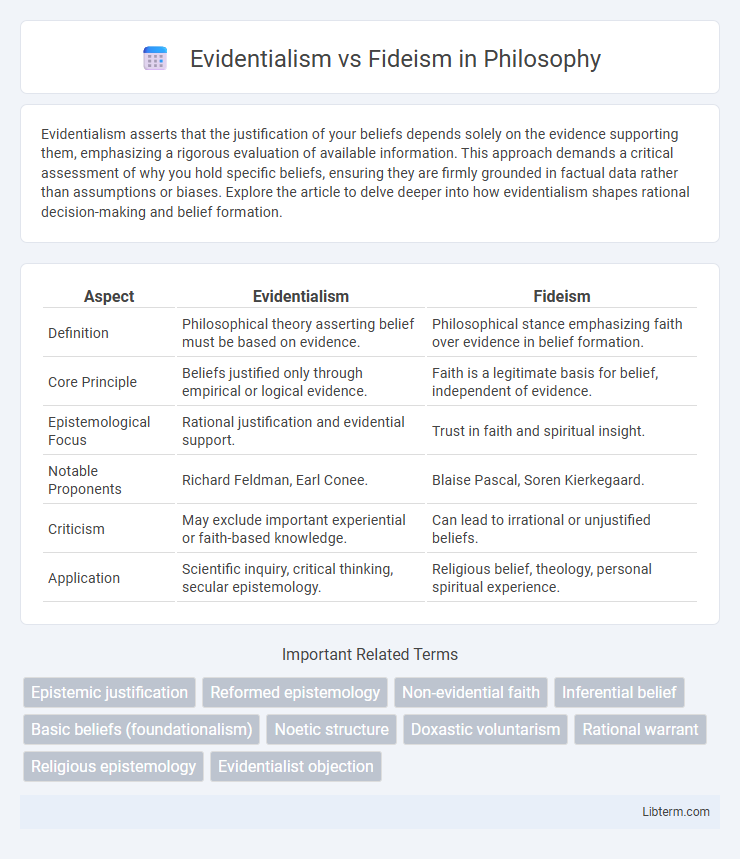Evidentialism asserts that the justification of your beliefs depends solely on the evidence supporting them, emphasizing a rigorous evaluation of available information. This approach demands a critical assessment of why you hold specific beliefs, ensuring they are firmly grounded in factual data rather than assumptions or biases. Explore the article to delve deeper into how evidentialism shapes rational decision-making and belief formation.
Table of Comparison
| Aspect | Evidentialism | Fideism |
|---|---|---|
| Definition | Philosophical theory asserting belief must be based on evidence. | Philosophical stance emphasizing faith over evidence in belief formation. |
| Core Principle | Beliefs justified only through empirical or logical evidence. | Faith is a legitimate basis for belief, independent of evidence. |
| Epistemological Focus | Rational justification and evidential support. | Trust in faith and spiritual insight. |
| Notable Proponents | Richard Feldman, Earl Conee. | Blaise Pascal, Soren Kierkegaard. |
| Criticism | May exclude important experiential or faith-based knowledge. | Can lead to irrational or unjustified beliefs. |
| Application | Scientific inquiry, critical thinking, secular epistemology. | Religious belief, theology, personal spiritual experience. |
Introduction to Evidentialism and Fideism
Evidentialism asserts that beliefs should be formed based on evidence, emphasizing that justification depends on the quality and quantity of supporting data. Fideism, in contrast, holds that faith is independent of evidence, proposing that religious belief or trust in certain truths can be rational without empirical support. The debate highlights the tension between empirical justification and faith-based acceptance in epistemology.
Defining Evidentialism: Evidence and Belief
Evidentialism asserts that belief must be proportioned to the available evidence, emphasizing that justification depends on empirical or rational support. In this epistemological framework, evidence functions as the primary criterion for rational belief formation, rejecting claims accepted without substantiation. This contrasts sharply with fideism, which holds that belief may rest on faith alone, independent of or even contrary to evidence.
Understanding Fideism: Faith Beyond Evidence
Fideism asserts that faith transcends the need for empirical evidence or rational justification, emphasizing trust in divine revelation or spiritual conviction as the foundation of belief. This perspective holds that certain truths, particularly religious ones, are accessible only through faith and not through logical proof or sensory experience. By prioritizing faith over reason, fideism challenges the evidentialist demand for evidence as a prerequisite for rational belief.
Historical Origins of Evidentialism
Evidentialism, with roots traceable to classical philosophy, gained prominence through 20th-century thinkers like William Clifford and C.A. Campbell, emphasizing that beliefs must be supported by adequate evidence to be justified. Its historical foundation lies in the Enlightenment's valorization of reason and empirical inquiry, contrasting sharply with fideism, which insists on faith without or even against evidence. The evidentialist tradition prioritizes intellectual responsibility and critical scrutiny, shaping contemporary debates on epistemology and religious belief.
Historical Development of Fideism
Fideism emerged prominently in the 19th century as a response to the limitations of rationalist epistemology, emphasizing faith over reason as the primary means of religious knowledge. Key figures such as Soren Kierkegaard advocated for subjective truth and an inner leap of faith, rejecting the necessity of evidential proof for belief. This movement challenged the Enlightenment's confidence in empirical evidence, shaping ongoing debates about the role of reason and faith in theological epistemology.
Key Philosophers: Evidentialism vs Fideism
Evidentialism, championed by philosophers like William Clifford and Richard Feldman, asserts that belief must be proportioned to evidence to be justified. Fideism, supported by thinkers such as Soren Kierkegaard and Blaise Pascal, maintains that faith transcends or even opposes rational evidence, emphasizing personal commitment and existential experience. The clash between these positions centers on whether rational evidence or subjective faith grounds religious belief and knowledge.
Major Arguments for Evidentialism
Evidentialism argues that beliefs must be supported by sufficient evidence to be rational, emphasizing the importance of empirical data and logical reasoning in the formation of justified beliefs. It holds that without adequate evidence, beliefs are irrational or unjustified, challenging fideism's reliance on faith independent of evidence. Major arguments for evidentialism include the promotion of intellectual responsibility, the prevention of epistemic error, and the alignment with scientific methodology that relies on observable and testable information.
Core Critiques of Fideism
Fideism faces core critiques centered on its rejection of evidential standards for religious belief, which critics argue undermines rational discourse and invites arbitrariness in faith commitments. The epistemological problem arises as fideism discounts empirical or logical justification, potentially leading to dogmatism and intellectual isolation. Moreover, evidentialism contends that rational evidence is essential for meaningful belief, challenging fideism's claim that faith alone suffices for knowing religious truths.
Evidentialism and Fideism in Contemporary Thought
Evidentialism emphasizes justification of beliefs through empirical evidence and logical reasoning, playing a crucial role in contemporary epistemology by advocating that belief acceptance requires sufficient evidence. In contrast, fideism asserts that faith alone, without evidential support, is a legitimate basis for religious belief, maintaining a significant influence in modern theological debates and the philosophy of religion. Contemporary thought often situates evidentialism as central to scientific inquiry, while fideism is recognized for addressing existential and spiritual dimensions beyond empirical verification.
Practical Implications for Religious Faith
Evidentialism emphasizes that religious faith should be grounded in empirical evidence and rational justification, promoting critical inquiry and skepticism within religious practices. Fideism asserts that faith is independent of evidence, encouraging believers to embrace spiritual truths through personal trust and revelation without requiring logical proof. The practical implications include evidentialism fostering interfaith dialogue and doctrinal scrutiny, while fideism supports personal conviction and resilience in the face of doubt or contradictory evidence.
Evidentialism Infographic

 libterm.com
libterm.com